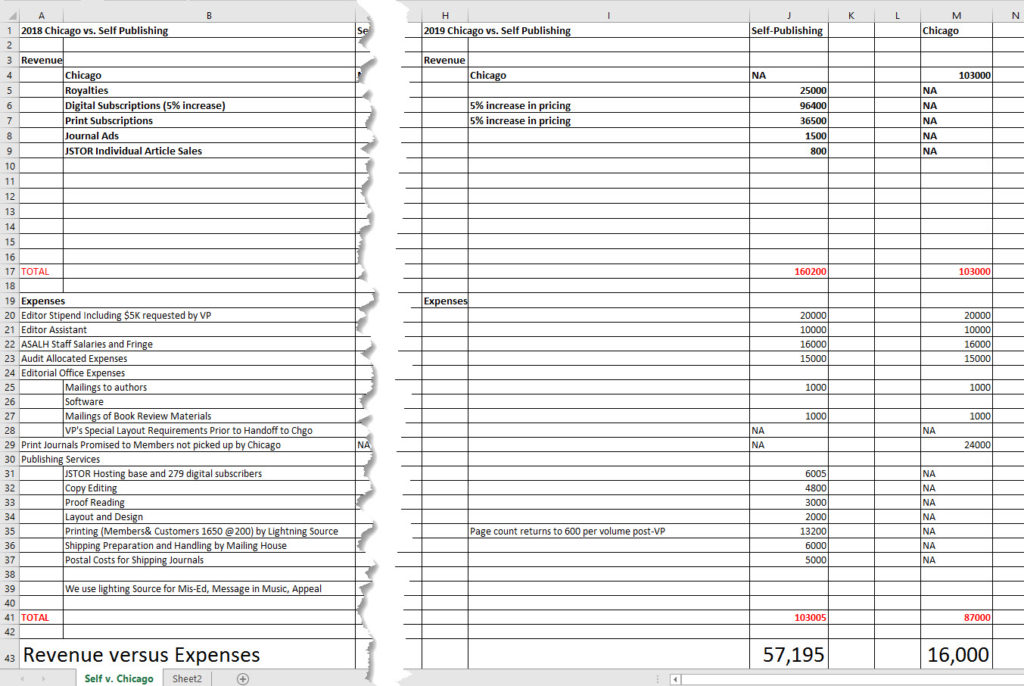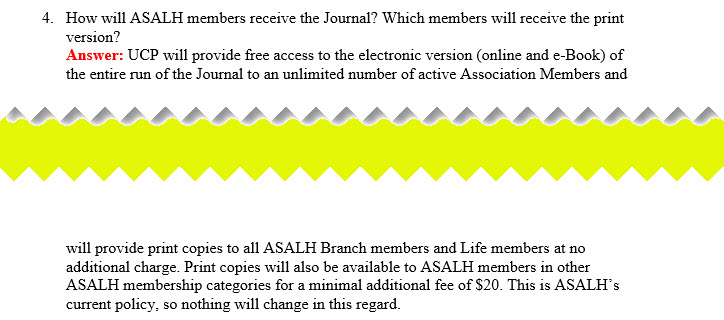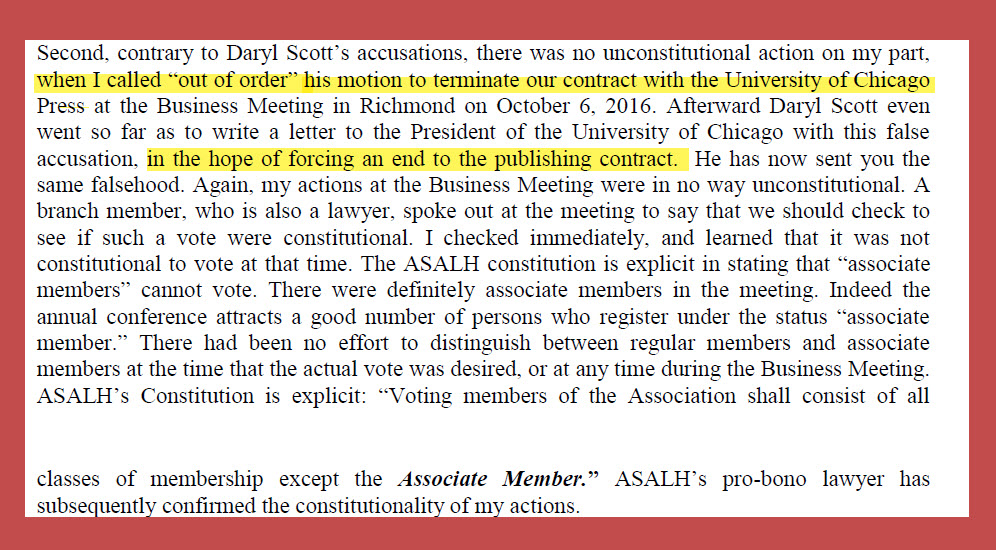Why Does the Regime Not Have Numbers for the Impending University of Chicago Press Decision?
 Unless those who believe only the Business Session of ASALH owns the publishing issue win the day, the ASALH Executive Council is poised to make a decision on the University of Chicago contract proposal on Tuesday. Despite having the basic proposal for nearly six months, the regime has not presented the board with the any financial information and analysis that should accompany a major decision. At the Business Session of the 101st Annual Meeting, Gilbert A. Smith, our treasurer and a CPA, told the members they that the $100,000 per year was all profit, not simply revenue. We have exposed that to be a lie, but since then neither he nor the committee headed by Sharon Harley has produced known expenses or a cost-benefit analysis. Although the council met in person last Friday and will vote on Tuesday, the editorial office expenses, including overhead, has not been represented to the decision makers–and the Chicago proposal makes clear it does not cover 100% of the publishing costs. And nothing that looks like a cost benefit analysis of self-publishing versus going to Chicago has been produced. Mind you, without such numbers two former presidents of ASALH, Robert Harris and John Fleming, have endorsed the move–somehow. This is not surprising giving ASALH’s history of making poor big decisions such as the purchase and sell of two headquarters buildings, the 14th Street property and Q Street. Given that this Association, founded by Carter G. Woodson, has self-published for a century and given that its journal is the oldest, scholarly journal in the black world–yes, the entire black world– you would think that due diligence would be done, that a sound basis for making a decision would be made. One is left to speculate aloud about why due diligence is not being performed. Why hasn’t it? Your guess is as good as ours, but let me suggest a number of possibilities.
Unless those who believe only the Business Session of ASALH owns the publishing issue win the day, the ASALH Executive Council is poised to make a decision on the University of Chicago contract proposal on Tuesday. Despite having the basic proposal for nearly six months, the regime has not presented the board with the any financial information and analysis that should accompany a major decision. At the Business Session of the 101st Annual Meeting, Gilbert A. Smith, our treasurer and a CPA, told the members they that the $100,000 per year was all profit, not simply revenue. We have exposed that to be a lie, but since then neither he nor the committee headed by Sharon Harley has produced known expenses or a cost-benefit analysis. Although the council met in person last Friday and will vote on Tuesday, the editorial office expenses, including overhead, has not been represented to the decision makers–and the Chicago proposal makes clear it does not cover 100% of the publishing costs. And nothing that looks like a cost benefit analysis of self-publishing versus going to Chicago has been produced. Mind you, without such numbers two former presidents of ASALH, Robert Harris and John Fleming, have endorsed the move–somehow. This is not surprising giving ASALH’s history of making poor big decisions such as the purchase and sell of two headquarters buildings, the 14th Street property and Q Street. Given that this Association, founded by Carter G. Woodson, has self-published for a century and given that its journal is the oldest, scholarly journal in the black world–yes, the entire black world– you would think that due diligence would be done, that a sound basis for making a decision would be made. One is left to speculate aloud about why due diligence is not being performed. Why hasn’t it? Your guess is as good as ours, but let me suggest a number of possibilities.
Why not Delineate the Expenses against the $100,000?
- Revealing expenses will confirm that the original position that the Chicago money was all profit was a flat-out a lie?
- Enumerated expenses will reveal that the promise that all members will receive free hard copies of the journal was a lie, too, or that keeping the promise will cost as much as $20,000 to $24,000?
- Disclosed expenses might reveal a decision to eliminate office staff whose position would be made superfluous by the contract?
- Reporting expenses would reveal an on-going overhead cost of $15,000 because it cannot be eliminated, reducing the revenue available after the deal?
- Reporting expenses would reveal a decision whether to increase the editor’s salary $5,000 or not, which was the origins of the entire fiasco?
- Fear that surplus revenue of $10,000 to $20,000 is not worth ending a century of tradition? This begs the question of the cost-benefit analysis.
- It would become clear that there would not be any money left to do all the wonderful things the for rest of the Association as the regime has suggested there would be.
Why not Prepare a Cost-Benefit Analysis? Well, It Would Reveal the following:
- We can make $200,000 over five years via self-publishing.
- We will have a $55,000 Reserve Fund proffered by the Get Right with Woodson Campaign.
- We can make more surplus revenue without eliminating a staff position.
- That the if the Chicago contract proved unprofitable, our revenue might slide 50% in five years and cannot be replaced.
- That it would cost us $20,000 or more to re-establish our self-publishing if necessary.
- The opportunity cost for not self-publishing. We could work with branches to place JAAH in primary and secondary schools, a place where Chicago cannot effectively market.
- Would reveal that something other than our traditional values and money were behind this entire project.
Those Right with Woodson Believe in Data

 For more information on the financial benefits of self-publishing. Despite the personal success of the folks who make our decisions, the collective failure of ASALH boards–past and present–reveals a fundamental shortcoming of our institutional life. How tragic it is it that Carter G. Woodson, who viewed the lack business acumen of educated blacks part of their mis-education, has been plagued by the shortcomings he sought to eliminate. It is almost as tragic as the organization’s losing its way on the question of self-determination. None of this is right with Woodson, and those of us who disagree will either stop this move before it happens or clean it up in its aftermath. Do know that the self-publishing tradition will prevail now or later.
For more information on the financial benefits of self-publishing. Despite the personal success of the folks who make our decisions, the collective failure of ASALH boards–past and present–reveals a fundamental shortcoming of our institutional life. How tragic it is it that Carter G. Woodson, who viewed the lack business acumen of educated blacks part of their mis-education, has been plagued by the shortcomings he sought to eliminate. It is almost as tragic as the organization’s losing its way on the question of self-determination. None of this is right with Woodson, and those of us who disagree will either stop this move before it happens or clean it up in its aftermath. Do know that the self-publishing tradition will prevail now or later.















